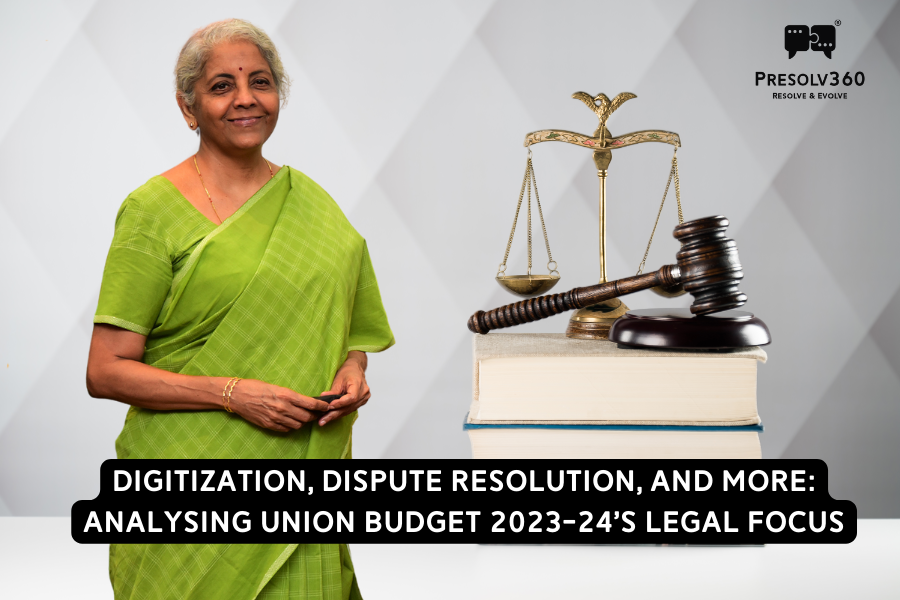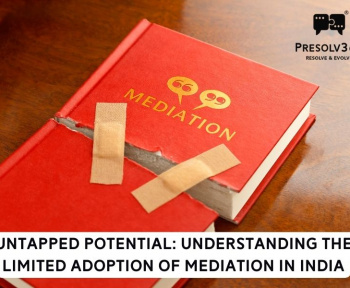The Union Budget 2023-24 speech in the Lok Sabha by Finance Minister (FM) Nirmala Sitharaman had several marquee announcements covering a range of sectors. India’s legal sector also featured prominently in the address, with proposals announcing new initiatives and overhauling some existing provisions for dispute resolution, data security, and more.

Here’s a quick overview of some of these key announcements:
Funding for Phase III of the eCourts Project
The FM announced an outlay of INR 7,000 crore for the launch of the third phase of the eCourts project. The project aims to bring the Indian judiciary in line with global standards and ease the burden on courts. The Supreme Court launched the E-Committee in 2004, which implemented two phases of the e-Courts Project. The first phase focused on the infrastructure and digitization’s technical aspects. The second phase then introduced systems that function independently and address the needs of litigants.
A Draft Vision document for Phase III was published in 2021. It envisions a Supreme Court eCommittee (SceC) to drive policy formation and create the Digital Courts Technology Office (DCTO). The DCTO will lead the design, execution, and implementation of digital infrastructure in the transitory stage of Phase III. The government’s substantial financial support will be crucial to this effort.
New commercial dispute resolution scheme
The Indian government is commonly perceived as the most prolific litigant in the country. In her address, the FM announced, “Vivad Se Vishwas 2 – To settle contractual disputes of government and government undertakings where an arbitral award is under challenge in a court, a voluntary settlement scheme with standardized terms will be introduced. This will be done by offering graded settlement terms depending on [the] pendency level of the dispute.”
The existing Vivad Se Vishwas scheme provides for the settlement of disputed tax, disputed interests, disputed penalty, or disputed fees in relation to an assessment or reassessment order on payment of 100% of the disputed tax and 25% of the disputed penalty or interest or fee. The new proposal aims to take this scheme even further. This would give much-needed relief to government entities as well as private organizations from long-drawn and costly litigations. It will also enhance the credibility and dependability of India’s judicial system amongst domestic litigants as well as foreign investors.
Safeguarding Indians’ data and documents
The Budget saw the announcement of two major data-focused proposals that will also affect the country’s legal justice system. These are the National Data Governance Policy (NDGP) and the Entity DigiLocker. The NDGP will aim to ensure greater citizen awareness, participation, and engagement with open data. It will also increase the availability of datasets of national importance and identify datasets suitable for sharing. Finally, it will improve overall compliance to secure data sharing and privacy policies and standards.
As part of the policy, the Indian government will also build the India Datasets programme. This will provide non-personal and anonymised datasets from Government entities that have data from Indian citizens or those in India. Private entities will be encouraged to share such data as well. Access to this anonymised data offers significant potential for improved research into AI and Machine Learning (AI/ML). The proposed Entity DigiLocker will enable secure online storage, sharing, and verifying documents for MSMEs, large businesses, and charitable trusts. Combined, these new proposals have the potential to significantly boost the growing Online Dispute Resolution (ODR) movement in India.
Cutting the legal red tape
The FM also announced, “For enhancing [the] ease of doing business, more than 39,000 compliances have been reduced and more than 3,400 legal provisions have been decriminalized.” She mentioned the launch of iGOT Karmayogi, an integrated online learning platform to upskill government employees. These initiatives will boost Indian MSMEs and make the Indian market more attractive for overseas investment. Additionally, they could also streamline the justice delivery system in India.
Mainstreaming ODR through upskilling
The Budget also revealed the plans for Pradhan Mantri Kaushal Vikash Yojana 4.0. The scheme is a massive three-year undertaking to upskill Indian youth through on-job training, industry partnership, and alignment of courses with the needs of industry. Alongside the proposed new-age courses like coding, AI, robotics, mechatronics, IOT, 3D printing, drones, and soft skills, we recommend the inclusion of a course on ODR. ODR uses technology in conjunction with Alternate Dispute Resolution techniques like negotiation, mediation, and arbitration to resolve disputes while cutting down significantly on associated costs of money, time, and effort required. Including an ODR course in this scheme as well as in the iGOT Karmayogi scheme will not only significantly assist in mainstreaming ODR in India, it will help build additional capacity in India’s legal delivery system, ensuring smoother and quicker access to justice for the country’s citizens.
The provisions included in the Union Budget 2023-24 offer significant opportunities for consolidating and streamlining India’s legal system, with a special focus on digitization. At Presolv360, we aim to leverage technology to enable the speedy and impartial delivery of justice via ODR and heartily applaud the vision and initiatives laid out in the Budget. Only through a concerted and combined effort can India’s judicial system deliver on its promise of Justice for All.




